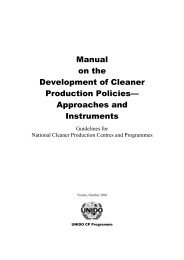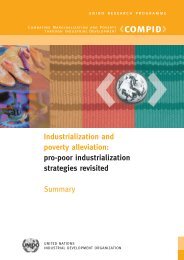(EGM) Foreign Direct Investment in Southeast Asia - Unido
(EGM) Foreign Direct Investment in Southeast Asia - Unido
(EGM) Foreign Direct Investment in Southeast Asia - Unido
You also want an ePaper? Increase the reach of your titles
YUMPU automatically turns print PDFs into web optimized ePapers that Google loves.
<strong>in</strong>dustrial base without rely<strong>in</strong>g to some extent on <strong>in</strong>fant <strong>in</strong>dustry protection.<br />
“Both early <strong>in</strong>dustrialised and newly <strong>in</strong>dustrialised countries applied the same<br />
pr<strong>in</strong>ciple, although to vary<strong>in</strong>g degrees and <strong>in</strong> different ways” (p. 2). In a<br />
world of different levels of <strong>in</strong>dustrialisation, market failures do not enable<br />
free <strong>in</strong>ternational competition to promote effective <strong>in</strong>dustrialisation <strong>in</strong> the<br />
least developed countries. Therefore, it appears reasonable that develop<strong>in</strong>g<br />
countries encourage their <strong>in</strong>fant <strong>in</strong>dustry by us<strong>in</strong>g the regulation of foreign<br />
<strong>in</strong>vestment. Nevertheless, regulation should be on a selective, rather than<br />
on a universal, basis and the level of protection should not be excessive.<br />
It is also arguable that regulation impedes FDI activity, and thus disfavours<br />
develop<strong>in</strong>g countries. In fact, these countries often have very high official<br />
costs of entry, and MNEs have to follow long procedures before <strong>in</strong>vest<strong>in</strong>g.<br />
Whereas regulation is meant to achieve socially superior outcomes by<br />
counter<strong>in</strong>g market failures (such as monopolies and negative externalities),<br />
<strong>in</strong> real terms regulation is very often associated with higher corruption and<br />
unofficial economies. Gratuitous regulation can benefit the regulator and not<br />
the whole society, and can prevent MNEs from <strong>in</strong>vest<strong>in</strong>g. Therefore,<br />
extensive regulation can have the opposite effect from its <strong>in</strong>itial purpose,<br />
s<strong>in</strong>ce it is associated with socially <strong>in</strong>ferior outcomes. Thus, as a logical<br />
corollary, FDI policies should be liberalised.<br />
However, it is worth mention<strong>in</strong>g that policies aim<strong>in</strong>g at liberalis<strong>in</strong>g FDI are<br />
not necessarily the best policies for creat<strong>in</strong>g a favourable <strong>in</strong>vestment climate,<br />
and even less so for attract<strong>in</strong>g or promot<strong>in</strong>g FDI. Moreover, one can note<br />
that the liberalisation process should not be seen as a decl<strong>in</strong>e of the role of<br />
the state, s<strong>in</strong>ce the measures mentioned above relate to government<br />
regulation. In fact, whereas the two first measures imply FDI liberalisation,<br />
their overall beneficial impact depends highly on the presence of competent<br />
and well-organised market supervision. Thus, one can argue that<br />
liberalisation and regulation of FDI are not contradictory, but rather<br />
complementary, <strong>in</strong> order to attract and promote FDI that is beneficial for<br />
boost<strong>in</strong>g <strong>in</strong>dustrial development.<br />
27

















